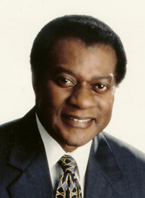Victor B. Lawrence: Difference between revisions
N.w.brewer (talk | contribs) No edit summary |
No edit summary |
||
| Line 11: | Line 11: | ||
An [[IEEE Fellow Grade History|IEEE Fellow]] and a member of the National Academy of Engineering, Dr. Lawrence has received numerous awards, including the 2004 IEEE Award in International Communication, and in 1997, he shared an Emmy Award for the HDTV Grand Alliance Standard. He currently serves as the associate dean and Batchelor chair professor of electrical and computer engineering and founding director of the Center for Intelligent Networked Systems at Stevens Institute of Technology, Hoboken, NJ. He holds numerous patents and publications in the telecommunications field. He received a bachelor’s of science, a Diploma from Imperial College (DIC), and a doctorate, all from the University of London in the UK. | An [[IEEE Fellow Grade History|IEEE Fellow]] and a member of the National Academy of Engineering, Dr. Lawrence has received numerous awards, including the 2004 IEEE Award in International Communication, and in 1997, he shared an Emmy Award for the HDTV Grand Alliance Standard. He currently serves as the associate dean and Batchelor chair professor of electrical and computer engineering and founding director of the Center for Intelligent Networked Systems at Stevens Institute of Technology, Hoboken, NJ. He holds numerous patents and publications in the telecommunications field. He received a bachelor’s of science, a Diploma from Imperial College (DIC), and a doctorate, all from the University of London in the UK. | ||
[[Category:Communications]] | [[Category:Communications|Lawrence]] [[Category:Transceivers|Lawrence]] [[Category:International affairs & development|Lawrence]] [[Category:Signals|Lawrence]] [[Category:Signal processing|Lawrence]] | ||
[[Category:Transceivers]] | |||
[[Category: | |||
[[Category:Signals]] | |||
[[Category: | |||
Revision as of 18:42, 2 March 2012
Victor B. Lawrence
In the last 30 years, Victor B. Lawrence has made a significant impact to the global telecommunications industry. His pioneering work has paved the way for many developments in broadband, DSL, HDTV technologies and wireless data transfer. Additionally, his advancements in V-series modem technology and international standards have had a global impact, enabling the interoperability of computer networks across the globe.
Dr. Lawrence spent most of his career at Bell Laboratories, where he worked in research and development in signal processing and communications. His application of signal processing to data communication led to many significant advances in high-speed transmission over the public switched telephone network (PSTN). He was the architect and lead engineer behind AT&T’s first 2400 bps full-duplex modem; he played a significant role in the development of every major international voiceband modem standard; and over the years, he continued to lead the innovations that resulted in modems up to 56 kbps. His continued efforts in communication transmission led to the development of wireless data modems and other high-speed data connectivity that helped to spur the growth of the Internet worldwide. Dr. Lawrence’s work on high-speed transceivers led to the creation of a variety of DSL technologies, which are widely used today for broadband services and high-speed access.
Dr. Lawrence is also an avid supporter of international education and technology exchange programs, and has personally championed the effort to bring fiber optic connectivity to Africa in order to improve the communications infrastructure of some of the world’s poorest countries.
An IEEE Fellow and a member of the National Academy of Engineering, Dr. Lawrence has received numerous awards, including the 2004 IEEE Award in International Communication, and in 1997, he shared an Emmy Award for the HDTV Grand Alliance Standard. He currently serves as the associate dean and Batchelor chair professor of electrical and computer engineering and founding director of the Center for Intelligent Networked Systems at Stevens Institute of Technology, Hoboken, NJ. He holds numerous patents and publications in the telecommunications field. He received a bachelor’s of science, a Diploma from Imperial College (DIC), and a doctorate, all from the University of London in the UK.
